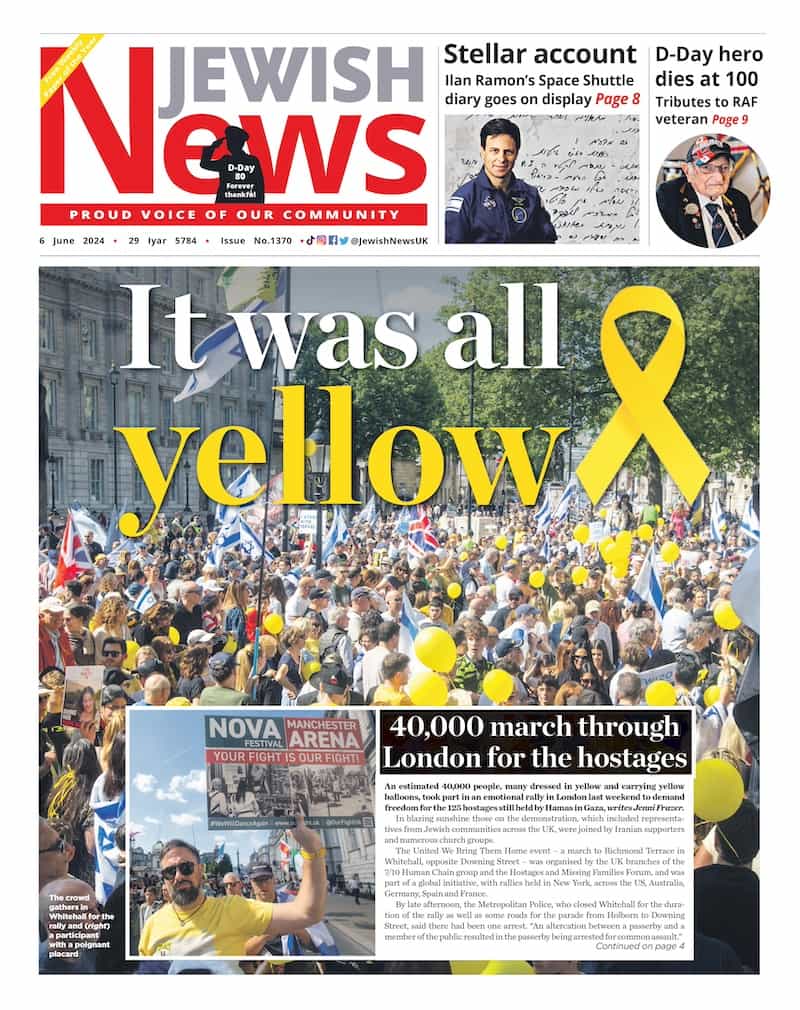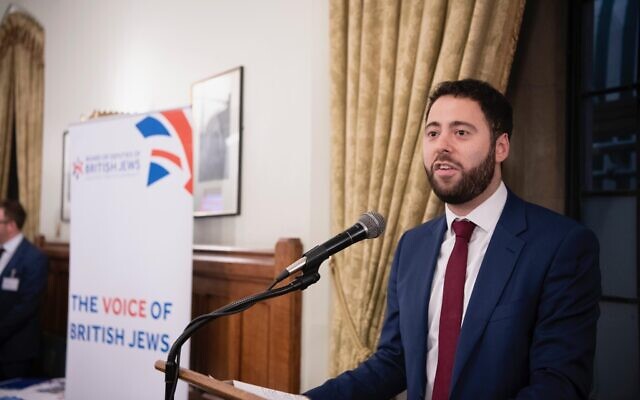INTERVIEW: Rosenberg promises to be a ‘unifying figure’ as new Board president
Incoming leader of the Board of Deputies discusses female leadership roles, interfaith and the prospects of a potential JLC merger under his watch
Lee Harpin is the Jewish News's political editor
Last weekend, a youthful 38-year-old clinched the presidency of the centuries-old Board of Deputies, marking a potentially transformative era in British Jewish communal life.
Yet, despite the fresh face at the helm, the Board’s top brass is now entirely devoid of diversity, with all its honorary officers seasoned men.
Has the Board, under its youngest leader, inadvertently taken two steps back? Phil Rosenberg begs to differ.
Under his leadership, the Board will, he promises, loudly and proudly echo every corner of the community.
In a wide-ranging interview he told Jewish News of his hope of becoming a “unifying figure” to the community in this country, while also becoming a leader who, in the aftermath of 7 October, can “build bridges outside”.
Declaring himself a “proud Zionist” but also somebody “not frightened” by the great range and diversity of views on difficult issues, including Israel, Rosenberg said: “I’m not scared to speak to people on my right or on my left, because I often find, genuinely, you learn something from people, if you listen.”
But the confident and energetic former pupil of City of London School, who went on to study Hebrew, Arabic and Spanish at Oxford, is only too ready to accept that his election victory also exposed issues that had led many to question the very future of Britain’s oldest communal organisation, founded in 1760.
A photograph on social media of Rosenberg lined up alongside newly elected honorary officers – senior vice-president Adrian Cohen, vice-presidents Andrew Gilbert and Jeremy Michaelson and treasurer Ben Crowne – confirmed the absence of female presence on the top team.
“We have a brilliant, brilliant team,” Rosenberg says of those elected to serve alongside him. “But we need to fix the gender issue. It is one of my top priorities and I’ve had all the initial conversations.”

Rosenberg’s nearest rival in a lengthy election contest, that improved in quality as it progressed, was Amanda Bowman, one of the most senior female faces at the Board, as a vice-president and as a chair of the defence division.
Rosenberg had pledged to appoint an independent chair to improve the running of the Board’s plenary sessions, previously led by his predecessor Marie van der Zyl herself.
It would be no surprise if Bowman were to be offered a senior role in the weeks ahead as part of a plan to improve female representation.
Rosenberg says that “all the best candidates are women” for the post of independent chair, with his new honorary officer team “currently discussing” how this appointment would be made.
He adds:“There is no dissent on this, because we’re all conscious that …. we are in a fortunate position because the Board has a lot of talent.
“I was trying to encourage other women to stand during the campaign. There are a number of issues we need to fix.
“This is a massive generalisation, but talented women often need to be asked to come forward. It’s still a cultural hang-up. It’s a barrier.”
He has nothing but praise for the work done by van der Zyl over the previous six years as president.
“Marie has given her all for the Board, and for the community throughout difficult times,” says Rosenberg. “You can boil it down to the four Cs: Corbyn, coronavirus, conflict and coronation. History should rightly say she took on all of those challenges and did a very good job of it.”
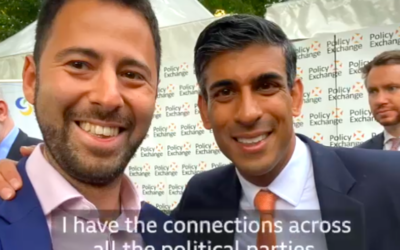
But it is clear Rosenberg, as he said throughout his campaign, now plans to devote time to attempt to remove some of the barriers that still prevent many in the community from involving themselves with the Board.
“We need everyone in the community to feel like the Board has a space for them, and that everybody can contribute,” he reiterates.
Which is not to say considerable progress was made under van der Zyl’s leadership.
Some of the inclusion across the Board is already “fantastic”, says Rosenberg, who cites the work done by LGBT+ deputies, along with the racial inclusivity report delivered by Stephen Bush, with a review of this to be published in days.
But in terms of bringing younger people into the Board he also speaks of his manifesto pledge to improve childcare facilities at Board meetings to make them more accessible to women and men with young children wishing to participate.
There is also a plan to bring schools on to the Board, with Jewish primary schools being allocated two deputies – one for a teacher, one for a parent governor – and for secondary schools to have representation at sixth-form level.
But there are also the big fundamental challenges impacting on the entire community, particularly in the aftermath of 7 October, and with antisemitism rising at an alarming rate, both in the UK and across the globe.
“I recognise that on some issues, and particularly on Israel, there is a great range of views and diversity,” he says, when asked how the Board under his leadership would aim to represent the entire community.
“I’m not frightened by that. I studied Hebrew and Arabic at university, I’ve worked for 20 years in Muslim/Jewish dialogue and in Israel/Palestinian dialogue. On Eid I exchanged messages with all of the Abraham Accords ambassadors. I have personally good and warm relations with a number of those embassies. This is genuinely who I am.”

Later, Rosenberg is equally forthright that he would be happy to sit down with those organisations within the Jewish community now openly questioning their support for a Jewish state, and for Zionism.
Asked about the growth in support, particularly among the young in the community for groups such as Na’amod since 7 October, he says: “I am a Zionist, and a proud Zionist, and speaking on Yom Ha’Atzmaut I think it is important to say that.
“But I am open to hearing [opposing] views, I would love to speak to them about that. I am not saying they don’t come at it without the right sense … no one likes to see the death and destruction we are seeing in Gaza.
“Hamas was the cause of it, but I appreciate none of us wants to see innocent civilians killed.
“But I think, and I say this from a respectful position, those who are taking an anti-Zionist position are making a mistake. My understanding of racism is that you can fight racism, you can run away from racism, or you can try and accept some of the views of the racists to make yourself acceptable to them. But the thing is those racists will never truly respect you.”
Accepting that a group such as Na’amod, unlike say Jewish Voice for Labour, does have support from people still committed and connected to the community, Rosenberg adds: “The numbers show that there are people who are fully committed involved in those movements, and I take them as genuinely affected and upset.
“But I would just say, be careful not to be inadvertently taking on the paradigm of those who will always hate us. It’s not because of this particular Israeli government, which we do all have views on. It is because ultimately they are not going to like us whatever we are.”
Rosenberg then stresses that “the sharpest rise in antisemitism after October 7, I believe, was in the first few days afterwards, before Israel had responded.
“I think that tells you something. It’s not because Israel was strong. It’s because Israel was weak and people thought they could pick on Jews.”
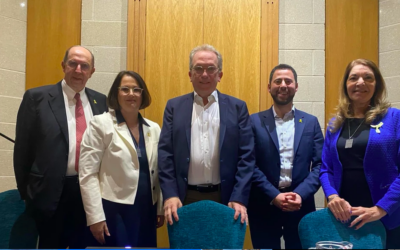
The new president is also only too aware that as well as facing challenges from the left, the Board’s authority to speak for the community has also been challenged by grassroots groups, with political leanings more to the right in recent years. Particularly thorough groups such as the Campaign Against Antisemitism.
Asked if he now plans to reach out to the CAA chief Gideon Falter, Rosenberg says: “I am sure with the right people in place we can build bridges in all directions.
“With all these things, it does take people who are willing to be partners, who are willing to work together. I see challenges not only in one section of the community. We have got some brilliant people, who happen to hold different views. If we can build trust and work together, who knows, let’s build a broader coalition.”
Just as significant for the Board is its future working relationship with the Jewish Leadership Council, its main rival organisation.
Rosenberg says he has yet to have the chance to read an ambitious report published by the JLC two months ago, which set out a blueprint on how the UK Jewish community should operate in the aftermath of the 7 October 7 attack.
The Forge The Future document outlined a series of goals in an attempt to grapple with some of the challenges facing the community now, but also appeared to point to a reduced role for the Board on the top-table at the JLC.
Rosenberg says: “I have to be honest, I haven’t yet read it [Forge The Future]. It’s high on my reading list. I will definitely read it. One of my first phone calls was with Keith Black, who I like and have good interaction with.”
But he then argues: “Obviously in my view the two organisations [the Board and the JLC)] should merge because there is a level of duplication and unnecessary competition.
“That being said, the two do great work, so if they are interested in discussing a merger, subject to ultimately, democratic control, because I think that is really important, the Board’s democratic legitimacy is one the community’s strongest things. But if there’s interest let’s discuss it. If there’s not, fine, we’ll work together and co-ordinate.”

Asked specifically about the radical plan to stop the Board president being an automatic trustee of the JLC, and for the Board to cease to be a JLC member, Rosenberg says: “I think, with great love, that was a mistake on their part.
“At a time when the community wants to see unity in the context of the war and the sharp rise in antisemitism. I don’t know what signal they were trying to send. The signal that came across to me and to others was there was politics being played here, and this may not have been their intention, at a time when we needed unity.”
Rosenberg, who grew up with a family who were active at Barnet United Synagogue, completed an internship at the Foreign Office, briefly worked at the Minister of Defence, but for most of his working career, served as the director of public affairs at the Board.
Previously a Labour councillor in Camden, with Jeremy Corbyn as leader of the Labour Party, Rosenberg says the Board role allowed him to build up close relations also with the Conservative Party.
“I was, I have been, and I am a member of the Labour Party, but I am always someone who has reached across the aisle,” he says. “As director of public affairs, the entire time the government was Conservative, and I developed excellent relations.
“Nick Timothy [chief of staff at Downing Street under prime minister Theresa May] and I worked together from time to time, both when he was in the Home Office and when he was in Downing Street. I am the kind of person who likes to have a diverse group of friends and political views.”
Rosenberg describes claims, which surfaced again during his election campaign, that he became too close to people around former Labour leader Corbyn during the fight against antisemitism as “tiresome”.
“My record speaks for itself,” he continues. “I was a victim of antisemitism in Jeremy Corbyn’s Labour Party. I appeared in the BBC Panorama programme, I had to deal with antisemitism firsthand.”
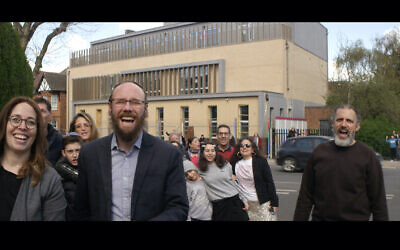
He says now his job at the Board was “to build ties across politics” to advance the community’s interests. “The record of what we achieved, and I do credit myself with some of this although it was a tremendous team effort, was in the results we saw. We turned things around.
“We were fair, but very firm,” he says. “I was the guy that came up with the Ten Pledges campaign that completely framed from a Jewish perspective the leadership contest which Keir Starmer won.”
Rosenberg said he worked “very closely” with both Starmer and “his team” to “change the party once they came in.” A handwritten letter of thanks from Sir Keir Starmer for helping to push back antisemitism is now a treasured possession, he says.
Rosenberg also concedes that we are fortunate to live in a country in which all of our mainstream political party’s share a respect and understanding of the community.
He praises current prime minister Rishi Sunak for the support he has shown to the community both in the face of rising antisemitism, and for Israel.
Rosenberg also rejects suggestions that it will be tough continuing to pursue his current career path, with the public relations and lobbying firm Fleetwood Strategy, while devoting time and resources to the unpaid role as Board president.
Isaac Levido, one of the founders of Fleetwood, is also known for his central role in Conservative Party election campaigns.
“If we want to bring people into the Board we have to make it something people my age can do,” says Rosenberg, accepting the fact that he will need to continue devoting time to his career to pay the bills.
He says unlike previous presidents, he plans to act as more of a chair, working alongside the Board’s “brilliant” chief executive Michael Wegier, and “empowering” the roles of his honorary officers.
But on possible conflict of interest issues around his Board role and his job as a lobbyist he adds: “Of course, you have to declare conflict in the right way. But the work that I do is complementary to what the Board does.
“As it goes, I’m in the world the Board works in. To deal with politics, media, diplomacy, actually that’s what I do. And I work 20 minutes away from Westminster.”

Rosenberg is also quick to pay tribute to two positive forces in his life as he pursued his energetic campaign to lead the Board.
As deputy for Brondesbury Park Synagogue in north-west London, he praises the help and support he received from “the most amazing community that tells a story of real hope for Jewish community” in a multicultural area of the capital, but one in which members do not have to hide their faith.
Rosenberg also pays tribute to his highly supportive wife Frances, who was alongside him at JW3 last Sunday when the election results were announced.
He describes her as “an inspiration” and his “absolute rock”, adding: “I can’t express how lucky I am. I love her more than I can ever say.”

Thank you for helping to make Jewish News the leading source of news and opinion for the UK Jewish community. Today we're asking for your invaluable help to continue putting our community first in everything we do.
For as little as £5 a month you can help sustain the vital work we do in celebrating and standing up for Jewish life in Britain.
Jewish News holds our community together and keeps us connected. Like a synagogue, it’s where people turn to feel part of something bigger. It also proudly shows the rest of Britain the vibrancy and rich culture of modern Jewish life.
You can make a quick and easy one-off or monthly contribution of £5, £10, £20 or any other sum you’re comfortable with.
100% of your donation will help us continue celebrating our community, in all its dynamic diversity...
Engaging
Being a community platform means so much more than producing a newspaper and website. One of our proudest roles is media partnering with our invaluable charities to amplify the outstanding work they do to help us all.
Celebrating
There’s no shortage of oys in the world but Jewish News takes every opportunity to celebrate the joys too, through projects like Night of Heroes, 40 Under 40 and other compelling countdowns that make the community kvell with pride.
Pioneering
In the first collaboration between media outlets from different faiths, Jewish News worked with British Muslim TV and Church Times to produce a list of young activists leading the way on interfaith understanding.
Campaigning
Royal Mail issued a stamp honouring Holocaust hero Sir Nicholas Winton after a Jewish News campaign attracted more than 100,000 backers. Jewish Newsalso produces special editions of the paper highlighting pressing issues including mental health and Holocaust remembrance.
Easy access
In an age when news is readily accessible, Jewish News provides high-quality content free online and offline, removing any financial barriers to connecting people.
Voice of our community to wider society
The Jewish News team regularly appears on TV, radio and on the pages of the national press to comment on stories about the Jewish community. Easy access to the paper on the streets of London also means Jewish News provides an invaluable window into the community for the country at large.
We hope you agree all this is worth preserving.

